USSYP Alumni Reflect on Amazing and Intense Experiences at the National Party Conventions.
Have you ever wondered what it would be like to be a delegate or work at a national political convention? Several of our USSYP alumni did just that and we thank the individuals listed below for telling us how those experiences changed and shaped their views. Read on to find out what it was like to be directly involved in these historic events – and to glean insight and share a great snapshot of democracy in action!
Convention Participants:
André Gonzales – USSYP 2016 – New Mexico
Matthew Keating – USSYP 2015 – Maryland
Michael Kikukawa – USSYP 2013 – Hawaii
Kate Krolicki – USSYP 2016 – Nevada
Richard Yarrow – USSYP 2015 – Maryland
What was your overall impression of being at the convention? What did it feel like?
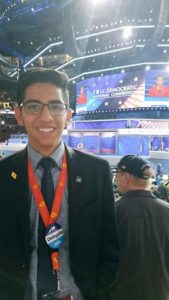
André: There have been two times in my life when I had to take a step back and just appreciate how lucky I am to be experiencing such amazing things, those two times being during the United States Senate Youth Program Washington Week and at the Democratic National Convention. The convention was a fast-paced, content-rich week that I had the absolute pleasure of spending with thousands of others who are so passionate and dedicated to the continuity of our democracy. From being able to listen to eleven-year-old Karla Ortiz stand before the nation and share a deeply personal story about her upbringing to witnessing history unfold right before my eyes as Secretary Hillary Clinton became the Democratic nominee, that week in Philadelphia truly changed my perspective on the United States and the world.
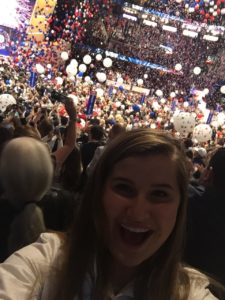
Kate: Being at the Republican National Convention truly felt like I played a part in history. The hype and excitement behind the party and the nominee (good and bad) engulfed everybody within the Quicken Loans Arena. Every speaker exuded an energy which captivated their passionate audience. To a person like me who loves this country and is fascinated with the political process – it bordered on a spiritual experience. No matter one’s opinion on the nominee, we were all bonded by our conservative beliefs and personal decisions to be Republicans. In the arena we were all one and the same, and that was a feeling I will never forget.
Matthew: Being at the Democratic National Convention was both invigorating and exhausting. A gathering of tens of thousands of people all focused on the same goal of promoting a shared vision for America is exciting, especially when you have worked hard over the years to help implement bits and pieces of it in your home state. Every staffer and delegate I talked to had donated their blood, sweat, and tears through campaigns and advocacy work to promote the ideals of the Democratic Party. The convention itself was wonderfully produced, with amazing speakers ranging from politicians at the local level to even President Obama himself. Caucus breakouts allowed delegates and staff to hear and discuss the party’s work in communities ranging from LGBT, to women, the disabled, and organized labor. The energy in the air was electric, and the historic nature of this convention only compounded this sentiment. Many people inside the stadium became emotional when Hillary Clinton officially accepted her nomination – as it was a milestone in American history and another solid step towards the full political and social integration of all kinds of Americans into the public sphere.
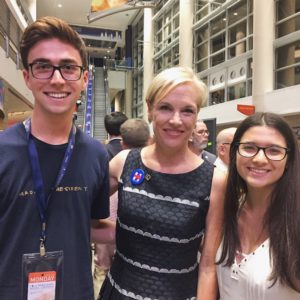
Michael: My overall impression of the Democratic National Convention was one of party unity and optimism for the future of our country. I was overjoyed to hear from a diverse array of speakers on a wide range of topics — from civil rights and Black Lives Matter to economic and foreign policy concerns. The most memorable speeches, however, were also the most emotional: ones given by the “Mothers of the Movement” and families of fallen officers, as well as the address by Khizr and Ghazala Khan. Every speaker painted a picture of America as a country with its brightest days still ahead of it. I left the convention filled with hope that we can work together to make the world a better place.
Richard: It was incredible. I could feel the rush and excitement in the air even at the Pennsylvania Convention Center, far from where the speeches took place. At the Wells Fargo Center, everything practically reeked of bustle and novelty: the crowds of first-time delegates; the creative hats (including one with a miniature Trump “wall”) and quirky handouts (Facebook provided a fan with Hillary Clinton’s face); the ambitious energy of some of the lesser-known speakers; the determined push of media crews desperate for a story and the equally determined push of visitors hoping to snag a selfie. I think, like many other Democrats, I came into the convention ambivalent about the candidates (to be honest, I split my primary vote between delegates for Sanders and Clinton). By the last day of the convention – and with the conclusion of the convention’s grand, overarching narrative – I felt thrilled about Clinton’s chances and ready to go out and campaign for her.
What was a typical day for you at the Convention?
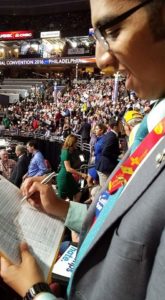
André: My typical day at the Democratic convention began with breakfast at around 8:00 am where the New Mexico and Arkansas delegations got to connect with each other and hear from prominent figures about what is at stake in this election. Then after that, usually I took off to the Convention Center for the caucus meetings. On one of my days I addressed and answered questions from 100 high school students from the Junior Statesmen of America who were in Philadelphia for the convention as well. Then in the afternoon I would try to make it to one of the luncheons that I had been invited to before finally making my way to the Wells Fargo Center for the floor session. After the floor session at the Wells Fargo Center, there was usually an evening reception to attend which would wrap up the festivities for that day.
Matthew: Every morning I woke up around 7:00 am to have breakfast with the Maryland state delegation, where we received a briefing from the state party chair and hosted a guest speaker. I reported to work around 11:00 am where we set up the press distribution center for the day. Even before the convention was convened at 4:00 pm, speeches were released by the Democratic National Campaign Committee (DNCC) communications team on embargo for reporters. That simply means that the speeches for that day were available for reporters to read, analyze, and report on before they were even delivered on stage. My job was to deliver these early copies of speeches to the media – ranging from big news outlets like CNN, NBC, Fox, to major newspapers, to the wires (AP, Reuters, etc.), to foreign media and university press outlets. Often several speeches were released at the same time, and with hundreds of outlets to deliver to, the runs had to be completed as quickly and efficiently as possible. “Press runs” at times literally meant running. The runs would continue until the DNCC had no more speeches to release. At that point, we were free to observe the convention and listen to the speakers.
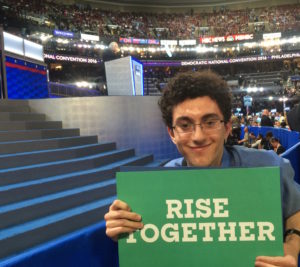 Richard: I stayed on the other side of the Schuylkill River. Every day, I would wake up around 6:00 am, eat breakfast (sometimes with the state delegation), and take the Market-Frankford line toward the Pennsylvania Convention Center. I would then spend a few hours helping the DNCC, visit some of the caucus or council meetings, survey the vendor areas, or go to a political event near Broad Street. Around 4:00 or 5:00 pm, I would take Philadelphia public transportation (the SEPTA – Southeastern Pennsylvania Transportation Authority) to the Wells Fargo Center, explore the arena, and talk with delegates. I usually would be somewhere on the floor (for two days, in the Florida delegation) during many of the speeches. By midnight, I would finally leave the Wells Fargo Center and would go on to a post-convention event (for instance, one held by People for the American Way). Afterwards, I might get to sleep by 1:00 or 2:00 am.
Richard: I stayed on the other side of the Schuylkill River. Every day, I would wake up around 6:00 am, eat breakfast (sometimes with the state delegation), and take the Market-Frankford line toward the Pennsylvania Convention Center. I would then spend a few hours helping the DNCC, visit some of the caucus or council meetings, survey the vendor areas, or go to a political event near Broad Street. Around 4:00 or 5:00 pm, I would take Philadelphia public transportation (the SEPTA – Southeastern Pennsylvania Transportation Authority) to the Wells Fargo Center, explore the arena, and talk with delegates. I usually would be somewhere on the floor (for two days, in the Florida delegation) during many of the speeches. By midnight, I would finally leave the Wells Fargo Center and would go on to a post-convention event (for instance, one held by People for the American Way). Afterwards, I might get to sleep by 1:00 or 2:00 am.
How were you selected to participate?
André: Since I was a delegate, I had to go through an election process in order to go to Philadelphia. For my particular position, I ran for a statewide position and had twelve other candidates seeking the same spot. After all was said and done, I was able to get close to 50% of the votes cast at the state convention. I was elected as an At-Large Delegate which means that I helped represent the 110,000 voters in New Mexico who voted for Secretary Clinton during the primary.
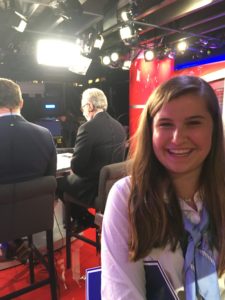
Kate: I filled out an application and needed to be nominated by at least two of the three members of the Nevada’s elected Republican National Convention delegates. This application asked questions about political activism and extracurricular activities. Each state has a different application process, but the Republican convention’s Committee on Arrangements selects and approves each application/nomination from every state.
Matthew: I applied for my position through the Democratic National Committee’s communications team.
What did you see or participate in that surprised you or was different from your expectations before you arrived?
André: I know that many of those at home may think that this year’s Democratic convention in Philadelphia was a sign that the Democratic Party is a party divided. However, after actually being there at the convention and seeing it all for myself, I could not think of anything further from the truth. What I saw in Philadelphia was thousands upon thousands of people coming together and showing just how passionate and invested they are in our democracy. It was quite a beautiful thing to see and to observe the camaraderie that was on display from everyone, regardless of whom they supported during the primary.
Kate: I knew that the convention would have the nation’s attention, but I never considered the extent to which the media truly played a part in making that happen. Most of the arena boxes were filled with makeshift newsrooms, ready to film and commentate on the action. The Republican convention also renovated the parking garage across the street and transformed it into “Media Row.” Everywhere I looked there was a camera, a news backdrop, and free Snapchat/Twitter swag. Media was a constant part of my convention experience, and that is something I didn’t even think about before I arrived. I only thought about the formal political process of securing the nomination, and not the organization of the event itself.
Matthew: I was surprised by how massive an operation the convention was. Our unit of press distribution was just one of hundreds of teams working to execute a specific role that insured a smooth convention. Volunteer positions ranged from directing delegates at the airport, to controlling access to the floor, to insuring everyone got enough food (by far the most important responsibility!). A pleasant surprise for me was the accessibility of our elected officials – senators and other congressional leaders could be seen walking on the floor and open to interaction with convention goers.
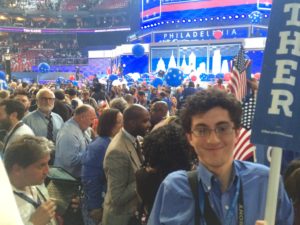
Richard: I attended Bernie Sanders’s July 25th address to his supporters, which was in a corner of the Pennsylvania Convention Center about ten hours before Senator Sanders gave his televised convention hall speech. The room was packed, and a series of progressive speakers first energized the crowd. One threatened that “civil disobedience will follow” if Secretary Clinton didn’t follow through on some of her campaign promises; another said that “we don’t have someone on the platform, on the chair who’s with us.” When Senator Sanders spoke, the crowds cheered him as he described his campaign’s goals and accomplishments. When he said, “We have got to elect Hillary Clinton,” though, the crowd broke into loud booing and shouts of “We want Bernie!” That outcry really surprised me, but what also surprised me was how quickly it seemed to change. By the last day of the convention, I saw delegates with signs that read “First Bernie, now Hillary,” and other delegates waving both “Bernie” and “Stronger Together” signs. If the Democratic attendees weren’t entirely unified at the beginning of the convention, it was remarkable – and comforting – how quickly they became unified by the end of it.
If you were working in any professional capacity, what was your function?
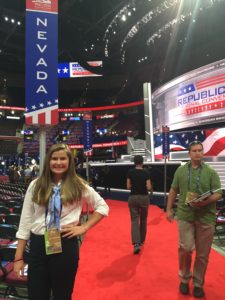
Kate: I was a page working for the Republican National Committee. Our main duty was to distribute all of the official convention material. Every morning or afternoon before the delegates arrived we placed different documents (i.e. the official Party Platform, Order of Business, Seating Chart etc.) on the delegate and alternate delegate seats. We were also responsible for passing out all of the signs television viewers would see being waved about. All signs on the convention floor were distributed by Republican National Committee pages, and some we even made ourselves. As pages we also had miscellaneous duties, such as being “seat fillers” within a delegation section, or even escorting people to the restroom facilities in media row.
Matthew: My job on the Press Distribution team was to deliver embargoed speeches to members of the media. My assigned section was the news-wires and writing center located right off the floor – which included major outlets like the Wall Street Journal, New York Times, and members of the White House Press pool.
What did you see and do as part of your state delegation?
André: I was part of the New Mexico state delegation. As a delegation, New Mexico was invited to many different receptions and events throughout the week. Since we shared a hotel with the Arkansas delegation, they did invite us to one of their receptions where we got to hear from President Bill Clinton. There was also another event that I attended with the Latino Leadership Network where we got to hear from Secretary of Housing and Urban Development Julián Castro as well as New York Senator Chuck Schumer.
Michael: I wasn’t an official member of the Hawai’i state delegation, but I did find them on the convention floor to say “Aloha.” It was a pleasure to meet the people who were representing my state so proudly; to talk about home and how excited we all were to be in Philadelphia and participate in a history-making convention. I was also able to talk to Senator Mazie Hirono, who I had interned for two summers ago. She gave me an update on members of her office whom I hadn’t seen in years, and we talked about how enthusiastic we were to support Hillary Clinton as our next president. The delegation reminded me why I am so gratified to call Hawai’i home, and I proudly wore the kukui nut lei and Democratic Party of Hawai’i pin they gave me.
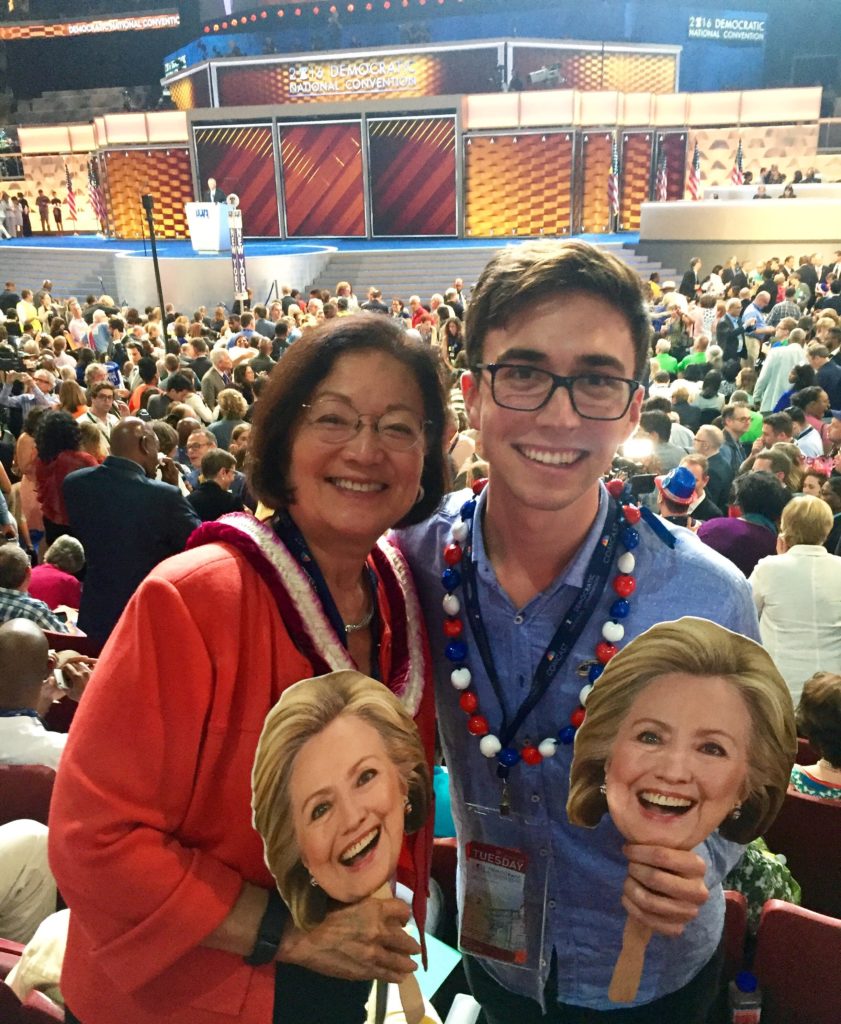
What would you like to tell other USSYP alums and future delegates about the importance of the party conventions?
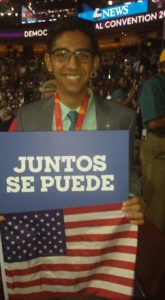
André: If there was one piece of advice that I could give to my fellow USSYP alumni as well as future delegates, it would be to run for and take advantage of these types of opportunities when they present themselves. I submitted my paperwork to run for a spot on the delegation out of pure impulse, not even thinking about the financial resources necessary to run the campaign or take part in the convention after I was elected. I learned that there are so many people and groups out there who are more than willing to help young people overcome these barriers. Young people absolutely deserve to be able to take part in these life-changing experiences and like the old saying goes, “If there’s a will, there’s a way.”
Michael: The party conventions are an important part of our representative democracy. They are a reflection of the diversity of opinion within each of our parties and are an excellent way to measure the health of our body politic. The conventions serve as an important stage from which each party is able to present its vision for the future, and to advocate for the changes in public policy and public opinion that each pursues. If you are ever given the chance to attend a party convention, I recommend that you jump at the opportunity. They are at the same time extravagant and fun, serious and wonky, and we are all the better for watching and listening to them.
Richard: I met some amazing delegates with phenomenal stories. One older delegate from California had campaigned for social justice causes for decades. One Indiana delegate had immigrated to the U.S. from Argentina, became active in progressive causes, and had travelled around the world promoting peace and nonviolence. However, I saw almost no delegates younger than 25. The Democratic Party may boast some impressive older delegates, but it’s missing the perspectives of youths and young adults. I think USSYP participants should be bold about filling in that gap and trying to become delegates for their states for future conventions.
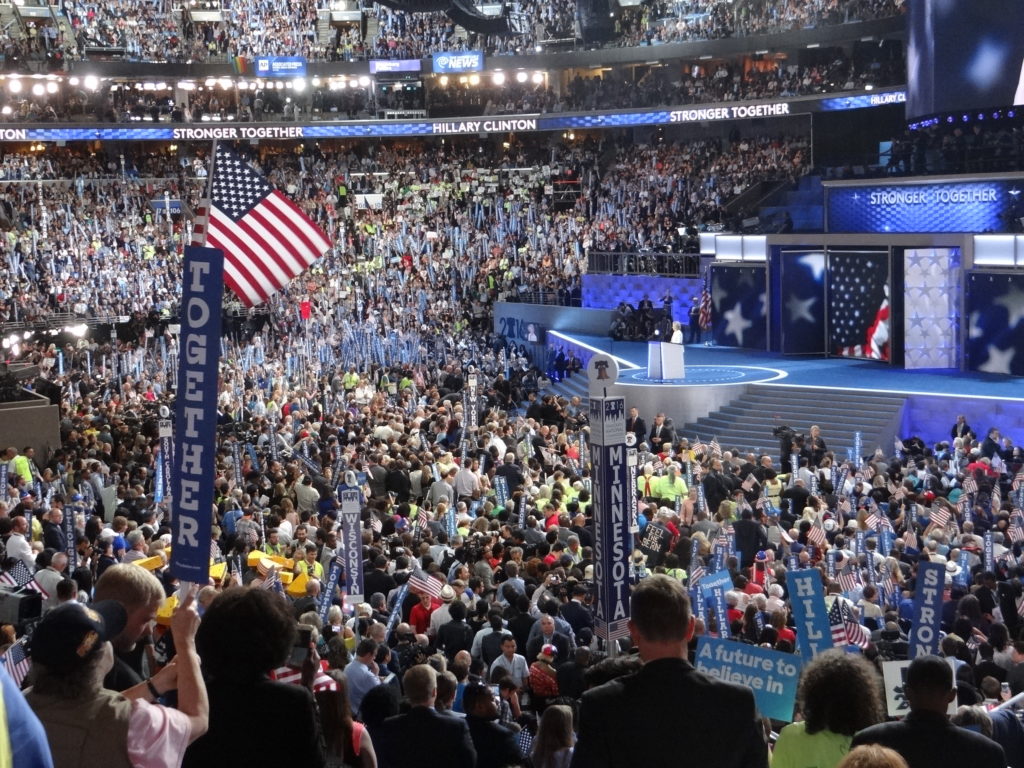
Photos courtesy of André Gonzales, Michael Kikukawa, Kate Krolicki and Richard Yarrow.
